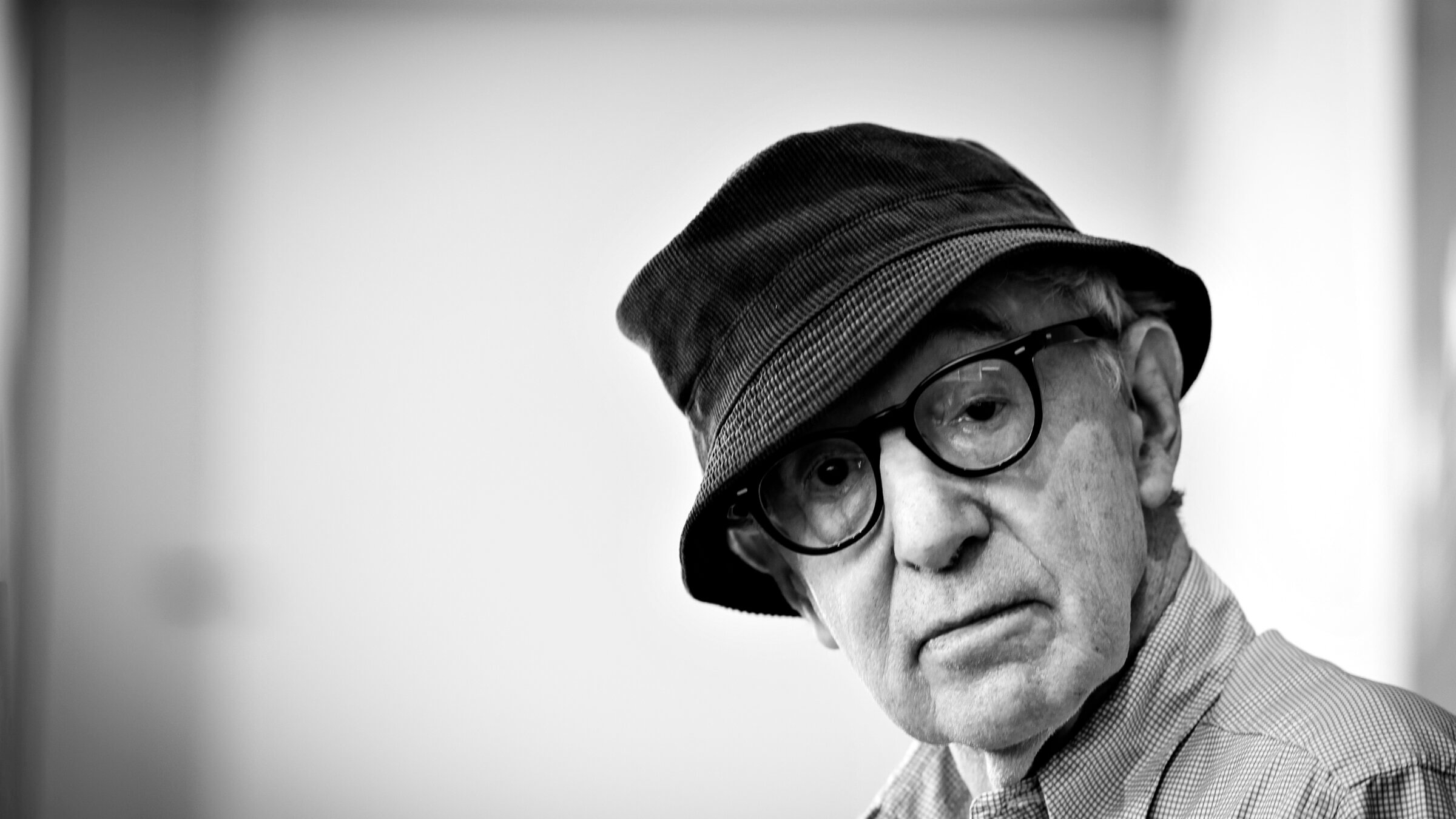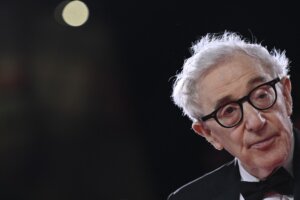Has Woody Allen ever told you how lucky he is?
With his 50th film, ‘Coup de Chance,’ the director shrugs off abuse allegations and returns once again to a theme that’s been a constant throughout his career

Woody Allen attends a photocall for the movie Coup De Chance at the 80th Venice International Film Festival on Sept. 4, 2023. Photo by Getty Images
VENICE — When Coup de Chance, Woody Allen’s 50th film, was announced as part of the Venice line-up earlier this summer, rumors swirled that the French-language film might be the director’s last. But speaking to journalists who had scored a coveted seat at the film’s press conference on Monday, the 87-year-old director gave no indication that he was ready to call it quits anytime soon.
Allen, who wore a checkered button-down shirt tucked into loose-fitting beige khakis, his signature black-framed glasses and a brown corduroy bucket hat, seemed tired, but his answers were lucid and witty.
“When I was younger the films that were most impressive to us when we were all starting out and aiming to be filmmakers were European cinema, all the French films, Italian films, Swedish films. We all wanted to make films like Europeans,” he said, adding that the experience of filming Coup de Chance in French with an all-French cast was rewarding because it made him feel like “a genuine European filmmaker.”
The European connection to Allen’s cinematic oeuvre is more than casual. He teamed up with Bergman’s cinematographer, Sven Nykvist, on four occasions in the 1980s and 1990s (most memorably for 1989’s Crimes and Misdemeanors). Coup de Chance reunites him for the fifth time with the great Vittorio Storaro (best known for shooting Bernardo Bertolucci’s best films as well as Apocalypse Now, for which he won an Oscar). Several of Allen’s films are idiosyncratic remakes of films by Bergman and Federico Fellini, two of the American director’s idols. Consider the parallels between Amarcord and Radio Days; Interiors and Cries and Whispers; and Wild Strawberries and Deconstructing Harry, to name a few examples.
Responding to a journalist’s question at the press conference, Allen denied that there was a conscious connection between Coup de Chance and Jean Renoir’s The Rules of the Game. Still, many elements in his new film are reminiscent of Renoir’s merciless class satire: the milieu of the cultured French elite, a jealous husband, a foolhardy lover of lower station, hunting accidents. But Coup de Chance has a greater affinity with two of Allen’s most acclaimed films, Crimes and Misdemeanors and Match Point, in its exploration of lust, luck, money and murder.
The film, about a rich, jealous husband, his young trophy wife and her bohemian lover, was cheered at the morning press screening. And while it isn’t a comedy, the film inspired the loudest laughter I’ve heard in a cinema during the festival for a particularly satisfying twist in the film’s final act.
Allen elicits strong performances from his four leads, especially Lou de Laâge as Fanny, whose affair with Alain (Niels Schneider), her former high school classmate sets the plot in motion. Allen keeps the atmosphere breezy, foregrounding his characters and their motives efficiently and carefully building suspense and tension. Parisians might object to the depiction of their city as a carousel of grand apartments and boho ateliers, sumptuous restaurants and stately public parks. Yes, this is still very much an outsider’s view of the city of lights, but that doesn’t work against the film. Storaro, who filmed Paris operatically in The Conformist and Last Tango in Paris, here captures the city’s beauty in a cooler, calmer register while songs by Nat Adderly and Herbie Hancock (rather than the 1930s swing jazz that often dominates the soundtracks of Allen’s films) give the film an off-kilter rhythm and restless energy.
As decades-old allegations of sexual abuse have been newly amplified in the wake of #MeToo, Allen’s reputation has taken a nosedive, particularly in America. (His previous two films, A Rainy Day in New York and Rifkin’s Festival, failed to secure theatrical distribution in the United States).

In addition to being his first film in a language other than English, Coup de Chance is also Allen’s first time back at major film festival since 2016’s Café Society, which opened that year’s Cannes Film Festival. (Allen’s relationship with the Venice Film Festival goes back to 1983’s Zelig; he was last on Lido with Cassandra’s Dream in 2007.)
If the cultural climate in the U.S. continues to be hostile to him, it seems likely that his next project may also come from abroad.
“Sometimes I’ll get a phone call from somebody in the country saying we will finance your film, if you make it in, you know, Icelandic or some other language,” Allen said at the press conference, adding that he’d only consent if he felt that the project and the location were a good match.
“If I have an idea that’s good for, you know, Germany or something, then I consider it. Sometimes I don’t know the country well, and I can’t,” he said.
But he added that he’d like to return home to the city that has served as the backdrop for the majority of his films. “I have a very good idea for New York,” he said. “If some guy steps out of the shadows and says we’ll finance your film in New York and obey all my terrible strictures — they can’t read the script, they can’t know who’s in it, they just give me the money and go away — if some foolish person agrees to that, I’ll make a film in New York,” he added.
At the press conference, Allen expounded on the role that dumb luck and blind chance — major themes not only in Coup de Chance but much of his work — play in our lives.
“I’ve been very very lucky my whole life,” Allen said. “I had two loving parents. I have good friends, I have a wonderful life and marriage, two children. I’ve never been in hospital or had anything terrible happen to me.”
“When I started making films, all the people chose to emphasize what I was able to do well and not hold me accountable for the things that I did poorly,” he continued.
“I’ve been very lucky with my filmmaking. I’ve had, over my lifetime, much undeserved praise and an enormous amount of attention and respect. And so I’ve had nothing but good fortune and I hope it holds out.”
“Of course, it’s early this afternoon,” he added. “So far, I’ve been very lucky.”
Allen’s film arrived halfway through the 80th edition of the Mostra del Cinema, as the event in known in Italian. Founded in 1932, it’s the world’s oldest film festival. In recent years, it has launched many of the big award-season’s films. Among this year’s starriest titles are Bradley Cooper’s Leonard Bernstein biopic Maestro, and Michael Mann’s Ferrari, starring Adam Driver as the founder of the legendary Italian sports car company.
Coup de Chance, which is far more modest that either of those titles, joins several other films by major Jewish filmmakers premiering screening at this year’s festival, including Roman Polanski’s The Palace and The Caine Munity Court Martial, the final film by William Friedkin, born the same year as Allen, who died in August.
Allen has a reputation for being allergic to public adoration — the Felliniesque Stardust Memories and Celebrity are abrasive satires of stardom and fandom — but in Venice, he was surprisingly gracious to the legions of admirers who had shown up to greet him.
Allen stopped to sign autographs on his way to the water taxi after the press conference, and later, on the red carpet. Allen, looking well-rested and smart in his tuxedo, attended the premiere with the film’s French cast as well as his wife Soon-Yi Previn, 52, and their adopted daughters Manzie Tio, 23, and Bechet, 24. Yet along with the excited cries of “Woody!” on the red carpet, a modestly sized group of demonstrators, some topless, protested the director as well as the Venice Film Festival for championing Allen and other directors who have been accused of sexual assault — Polanski (who did not attend the festival) and Luc Besson — by featuring them in this year’s line-up. Their chants accused the festival of fostering a “culture of rape.”
There was no such disruption inside the packed Sala Grande, where the audience cheered Allen’s entrance. When the lights came up, the audience erupted in applause. Allen slowly got to his feet. It was as if he was assessing whether the ovation was merely polite or dutiful. He seemed to decide that the crowd’s enthusiasm was genuine and with some difficulty, removed his bowtie. He looked relieved, and even pleased, at his late-career coup de chance.




















